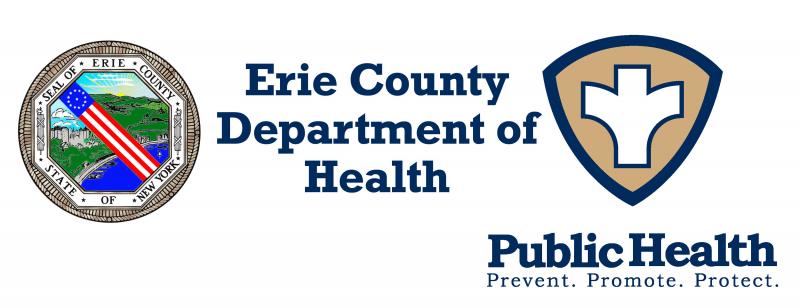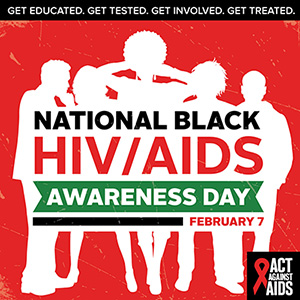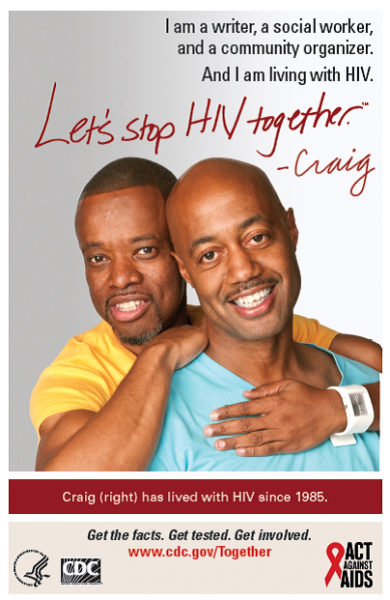Modified: February 1, 2018 12:23pm
Latest News

PRESS RELEASE
From the Office of the Commissioner of Health, Dr. Gale R. Burstein
Date: February 1, 2018
CONTACT: Mary C. St. Mary/Mary.StMary@Erie.Gov
Phone: 716.858.4941/ Mobile: 716.253.3925
National Black HIV/AIDS Awareness Day
Black Men and Women face a Higher Risk of Being Exposed to HIV Infection
ERIE COUNTY, NY—Blacks/African Americans account for a higher proportion of new HIV diagnoses, those living with HIV, and those ever diagnosed with AIDS, compared to other races/ethnicities. 
In 2015, African Americans accounted for 45% of HIV diagnoses, even though they comprise 12% of the US population.
February 7th is National Black HIV/AIDS Awareness Day (“NBHAAD”). This year’s theme: Stay the Course, the Fight is Not Over!, emphasizes our responsibility to stand united with our family and friends in the fight against HIV and AIDS.
Black men and women face a higher risk of being exposed to HIV infection than do other racial/ethnic groups because the prevalence of HIV is greater in Black communities than in any other racial/ethnic group.
NBHAAD has four key focus areas which encourage people to:
• Get Educated about HIV and AIDS;
• Get Involved in community prevention efforts;
• Get Tested to know their status; and
• Get Treated to receive the continuum of care needed to live with HIV/AIDS.
“National Black HIV/AIDS Awareness Day is a time for us to remember those affected by this disease while focusing on the work we do every day to prevent new HIV infections. “Testing is at the core of this initiative and is critical for HIV prevention in Black communities,” said Dr. Gale Burstein, Erie County Commissioner of Health (“ECDOH”). Identifying persons with HIV/AIDS as quickly as possible so they can begin treatment is the first and most important step.”
Here are several good reasons to get an HIV test:
- Learning early can help you live a longer, healthier life.
- There are treatments available that can keep you healthy and you can find support so that you stay connected to care.
- If you know, you can look out for yourself—and the people you love. Knowing early enables you to help yourself and to protect others. Studies have shown that when people learn they have HIV, they are more likely to take steps to protect their health and that of their partners.
- The earlier you know, the more you can do. There is new hope today for stopping HIV. Medicines (antiretroviral therapy or ART) can lower your body’s virus level and help people with HIV live longer, healthier lives and greatly reduces the chance of passing HIV on to others.
- It’s easy. It’s free, fast, and confidential.
“Unfortunately, many of those who are infected with HIV, regardless of race or ethnicity, are unaware of their status and may unknowingly transmit the virus to others,” added Burstein. “HIV seriously threatens the health and well-being of Black men and women across our nation. It is time to talk openly about this devastating disease so we can improve the health of Erie County’s Black community.”

In addition, the ECDOH Sexual Health Clinic offers a Pre-Exposure Prophylaxis or “PrEP” program for HIV/AIDS. PrEP is a once a day pill for people who are HIV negativeto help them stay negative. When someone is exposed to HIV through sex or intravenous drug use, this medicine can work to keep the virus from establishing a permanent infection. Call the PrEP Clinic at 716-858-7942 for more information.
Compared to other races/ethnicities, Black men and women face a much higher risk of infection. Social and economic realities such as poverty, racial discrimination, less access to healthcare and higher rates of incarceration that exist in some Black communities may contribute to this increased HIV risk. Stigma, fear, discrimination, and homophobia also place many Blacks and African Americans at risk.
Whether it’s a conversation, text message, Facebook status update, or a tweet—the time to talk to each other about HIV is NOW. We can prevent new HIV infections today. We can have a healthier community for all our tomorrows.
# # #
For More Information:
Erie County Department of Health STD Clinic and Information
Erie County Department of Health Pre-Exposure Prophylaxis Program
CDC-Fact Sheet HIV among African Americans

